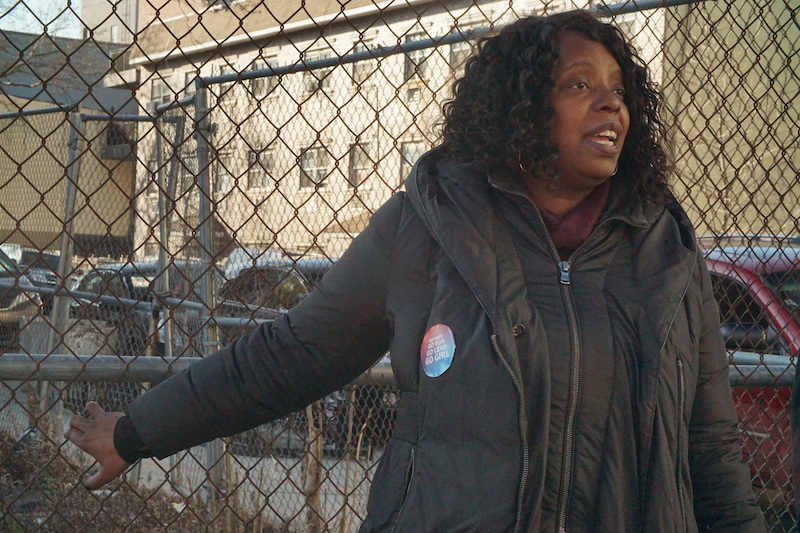The delay of the hotly contested tax lien sale to November 3 is not enough for an advocacy group in East New York that has started circulating a petition to abolish it all together.
Assemblymember Latrice Walker (D-Brownsville) and Candidate Wilfredo Florentino, who’s running for the 42nd District Councilmember Inez Barron’s seat in East New York, threw in their support for changing what’s considered an unjust system.

“It is time to stop making money off of communities and families that have been looked over for decades. The tax lien sale perpetuates the cycle of poverty for working-class families and destabilizes communities. This tax lien sale is a ploy to fast-track redevelopment and gentrification. I am in favor of abolishing the tax lien sale – anything that stabilizes communities is what I am in favor of,” said Walker.
The East New York Community Land Trust (CLT) Initiative is campaigning to get rid of the tax lien sale because of its impact on Black and Brown homeownership in their district, and neighboring Cypress Hills which is currently unrepresented in the city council, said Community Organizer Hannah Anousheh.
The CLT got together as part of a community land trust learning exchange and is funded through the city council, said Anousheh. They have community workshops and reach out to homeowners with properties listed about navigating the system, said Anousheh.
The current lien sale list, posted by the Department of Finance (DOF), has more than 1,200 properties across the 41st, 42nd, and 37th city council districts.
“The addresses are all publicly available and so investors really, really prey on the people on that list,” said Anousheh. “That list has become a target for aggressive investors because they assume people on the list don’t have it together. Many of them are seniors. Many of them have paid off their mortgage but their property taxes have gone up.”
“What we’re really advocating for is a no reauthorization of the lien sale,” said Anousheh, meaning a bill that has to be voted on and rejected in city council as opposed to passed like it did in 2017. The current law authorizing the tax lien sale expires December 31, 2020.
According to a comptroller’s report, the annual lien sale has been authorized in New York City since 1996 under former Mayor Rudolph Giuliani, with newer additional forms of debt like water, sewer, and other property related charges.
The enactment was a response to the 1970s housing crisis, when abandoned homes and vacancies became a real problem. Both national and local economic trends made it more difficult for property owners to pay their taxes, so the city started taking over properties with one year of delinquent taxes through “in rem foreclosure actions.” The move backfired in saving the city when, by the early 1990s, the Department of Housing Preservation and Development (HPD) “had become the City’s largest landlord,” costing the city millions to maintain.
The lien sale generated much-needed revenue for the city by collecting unpaid debt.
“The tax lien sale promotes voluntary compliance with property taxes, the City’s largest source of revenue. The primary goal is not to sell liens but to get as many owners as possible to pay. Under the tax lien sale, the property tax delinquency rate has decreased from 5% to 2.2%. Each percentage increase in the delinquency rate costs the City more than $300 million,” said a DOF spokesperson.
The lien sale process has undergone many reforms over the years, provides at least four notices before the sale, does offer payment agreements, and a window of time to pay off the lien, but there can be negative implications for many homeowners who are unfamiliar with the process.
The report assessed the housing situation in 2011 and 2012, stating that “Brooklyn experienced the greatest impact, where 725 one- to three-family homes had their liens sold. Many of these properties were located in Community Districts 3, 4, 5, and 16, which are home to such neighborhoods as Bedford Stuyvesant, Bushwick, East New York, and Ocean Hill.”

“The disproportionate implications of a tax-lien sale in East New York during a worldwide pandemic are aided by the effects of the city-led 2016 East New York rezoning, which the community, local non-profits and I opposed,” said Florentino about this year’s housing situation since the COVID-19 crisis hit the city.
“The privatization of debt in our communities through the tax-lien sale guarantees displacement, and ushers in gentrification on a city-sanctioned red carpet. The city should be moving with a sense of urgency and empathy to not only suspend the 2020 tax lien sale, but permanently end its discriminatory effects on poor Black and Latinx communities,” said Florentino.
Walker said, as an active member of the Housing Committee in the assembly, she is strongly in support of affordable housing with a specific emphasis on affordable homeownership.
“Homeownership should be one of the basic ways to obtain generational wealth. I have always been at the forefront advocating for the continuance and broadening of generational wealth in Black and Brown communities. For hundreds of years Black and Brown people have been denied the constitutional protections of property ownership,” said Walker.
“I fully support the abolishment of tax lien sales. Over two hundred homes on the list are properties built by affordable homeownership programs like the ‘Nehemiah Homes.’ While the tax lien sale generates approximately $34 million in revenue for New York City, it does so on the backs of low-income earners, many of which have been kept out of the housing market by redlining and discriminatory bank lending practices,” said Walker.
Anousheh suggested a grant system or automatic payment plan as an alternative to the sale. “There must be more fair ways of doing this and we would love to work with the DOF, city council, to make that happen, but the first thing is they can’t renew it,” said Anousheh.






